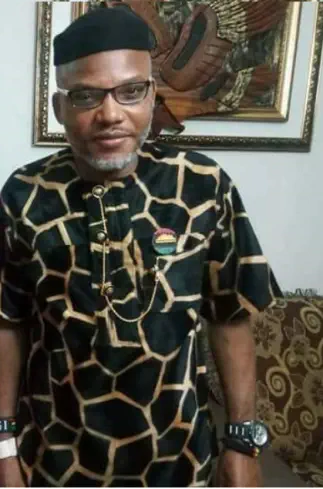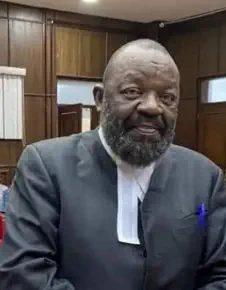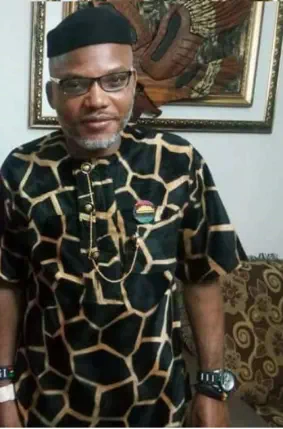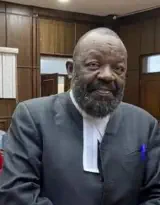IGBOFOCUS






















The purpose of this essay is to enhance a better public understanding of the arcane dimensions and
complexities arising in the case of Mazi Nnamdi Kanu from 24th September 2024 (when Justice Binta
Murtala-Nyako was recused) to 10th February 2025 when Mazi Nnamdi Kanu was surprisingly summoned
to appear before the same Justice.
Despite our abhorrence for the summons to appear before a Judge who no longer possessed jurisdiction,
we nonetheless decided to honor the summons out of respect for the sanctity of the judiciary and the
overriding need to avoid the fell consequences of an in-absentia proceedings that would be legally
injurious to our Client. So, we appeared with the self-assurance and confidence that the proceedings
would, as a matter of law, amount to a nullity because the Judge, having been recused by an extant Order
of court, no longer possessed the requisite jurisdiction to conduct the hearing.
It therefore came to pass that when the case was called, I immediately went on the record to state that we
appeared “under protest”, and that our “limited” appearance is specifically aimed at protecting the
constitutional rights of Mazi Nnamdi Kanu and thus should, in no way, be misconstrued as succumbing to
the jurisdiction of the court.
Given this scenario, it therefore follows that - as far as it was conducted by a recused Judge - the infamous
proceedings of 10th February 2025 carried all the elements of a “mistrial” of some sorts, to the extent that
the purported order of adjournment sine die made by the Judge at the close of the “hearing” is obviously
nugatory and of no legal or judicial effect whatsoever. Below are the additional reasons for our position:
First of all, the process by which Honorable Justice Murtala-Nyako exited from the case as the trial judge
was a “judicial event”, as it emanated from the COURT ORDER she made on 24th September 2024. A plain
reading of the Order shows that Her Lordship graciously consented to the recusal and that alone
amounts to an additional factor that endowed the order with more tenacity.
Second, of then and now, the said Order is still extant and subsisting and was never appealed. So, it
remains valid in all ramifications. To be sure, the Judge cannot REVIEW, REOPEN or REVISIT the matter of
her recusal because she became FUNCTUS OFFICIO as of 24th September 2024 when the order was
entered and enrolled. In Ukachukwu v. Uba (2005) 18 NWLR (Pt.956), it was held that: "The phrase
"functus officio" has been defined to mean a task performed, fulfilling a function or discharging and
accomplishing the intended purpose, and when it is referred to a Court, that Court will have no further
force or authority in effect it would lack competence or jurisdiction in the matter anymore. It cannot
review, re open or re-visit the said matter except under exceptional circumstances.”
Third, the point needs to be made that the post-recusal Summons issued to Mazi Nnamdi Kanu that
brought us to Court on 10th February 2025 is not to be blamed on the Court alone. The prosecution
grandfathered this infamous unconstitutionality by a Letter it wrote to the same Court on 5th December
2024, requesting that the case be re-calendared for a hearing. In our prompt reaction and after a
considered view that the said Letter strained the boundaries of prosecutorial misconduct, we countered
with a reply, vehemently opposing re-listing the case to be heard before a Judge who is bound by an
extant Order of recusal. To this date, the Chief Judge of the Federal High Court has not respondent to our
Letter.
Further to the foregoing, and in our efforts to foreclose what we reckoned to be a burgeoning
unconstitutionality that lies in sending the case back to the recused Judge, we took the responsible step of
generating a Letter to the Honorable Chief Judge of the Federal High Court, requesting for transfer of the
case to the Southeast. We took this step because we were reliably informed that the “official” reason for
sending the case back to the recused Judge is because no other Judge in the Abuja Division of the Federal
High Court is willing to take the case. And the reason why Southeast is in play (to the exclusion of other
zones) is because, being the place where the offenses were alleged to have had impact, it possesses far
superior jurisdiction to every other division, including Abuja.
Now, having come to this pass, the next logical question is: What’s the way forward? The answers are
simple and they are as follows:
a. If no Judge (other the recused Judge) in Abuja is willing to try the case, the next lawful thing to do is - on
the authority of Section 45, Federal High Court Act & James Ibori v. FRN - to transfer the case to any of the
Federal High Court divisions in the Southeast.
b. If there’s some sort of a “secret official embargo” in having Mazi Nnamdi Kanu tried in the Southeast,
you cannot keep him in an endless limbo while he’s detained as an awaiting-trial. Awaiting which trial? A
trial that cannot happen in Abuja or Southeast?
c. In every common law country, when a State has an insurmountable difficulty in putting a detainee on
trial within a reasonable time, the next responsible and lawful option is to release such a detainee until
such a time his trial can be properly conducted, subject to any statute of limitation that may be
applicable.
d. Under the Constitution, every criminal suspect, especially a detainee, deserves to be tried within a
reasonable time, not an indefinite time, not being in detention for almost four years awaiting trial that
never happens for no fault of the detainee but of the State. Additionally, the Administration of Criminal
Justice Act prescribed a day-to-day trial for every criminal suspect. It becomes more urgent and
compelling when such suspect is in detention, and a lengthy one to boot.
e. To sum up, we make bold to say that the ball is firmly and exclusively in the court of the Federal
Government, in the sense that since it has proved unable to bring Mazi Nnamdi Kanu to trial within a
reasonable time, then the next best thing (which is also lawful and constitutional) is to end this whole
saga honorably by releasing Mazi Nnamdi Kanu either through restoration of his unjustly revoked bail or
by a prompt discontinuance of a case that was burdened by high-wire politics from its inception ten years
ago in 2015.
The Mistrial Of Mazi Nnamdi Kanu

Written by Aloy Ejimakor
12th February 2025

Mazi Nnamdi Kanu
•
Home
•
About Us
•
Biafra
•
Igbo Alphabet
•
Igbo Books
•
Igbo Cartoons
•
Contact Us
•
Igbo Names
•
Aburi Accord
•
Birds’ Names in Igbo Language
•
Drinks’ Names in Igbo Language
•
Everyday Igbo Words
•
Fruits’ Names in Igbo Language
•
Animals’ Names in Igbo Language
•
Human Parts in Igbo Language
•
Igbo Christian Music
•
Igbo Foods
•
Igbo Greetings
•
Igbo Language
•
Igbo Letter Writing
Copyright © Igbo Focus. All Rights Reserved.
•
Igbo Market Days
•
Igbo Modern Music
•
Igbo Music
•
Igbo Numbers
•
Igbo Photos
•
Igbo Traditional Music
•
Igbo Videos
•
Insects’ Names in Igbo Language
•
News
•
Newspapers
•
Nigeria Biafra War
•
Plants & Trees’ Names in Igbo Language
•
Reptiles’ Names in Igbo Language
•
Support Igbo Focus
•
The Obi Family
•
The Use of Kedu in Igbo Language
•
The Use of Na in Igbo Language
•
The Use of Wete in Igbo Language
•
The Use of Ya in Igbo Language
•
Vehicles’ Names in Igbo Language
The purpose of this essay is to enhance a
better public understanding of the arcane
dimensions and complexities arising in the
case of Mazi Nnamdi Kanu from 24th
September 2024 (when Justice Binta
Murtala-Nyako was recused) to 10th
February 2025 when Mazi Nnamdi Kanu
was surprisingly summoned to appear
before the same Justice.
Despite our abhorrence for the summons
to appear before a Judge who no longer
possessed jurisdiction, we nonetheless
decided to honor the summons out of
respect for the sanctity of the judiciary and
the overriding need to avoid the fell
consequences of an in-absentia
proceedings that would be legally injurious
to our Client. So, we appeared with the self-
assurance and confidence that the
proceedings would, as a matter of law,
amount to a nullity because the Judge,
having been recused by an extant Order of
court, no longer possessed the requisite
jurisdiction to conduct the hearing.
It therefore came to pass that when the
case was called, I immediately went on the
record to state that we appeared “under
protest”, and that our “limited” appearance
is specifically aimed at protecting the
constitutional rights of Mazi Nnamdi Kanu
and thus should, in no way, be
misconstrued as succumbing to the
jurisdiction of the court.
Given this scenario, it therefore follows that
- as far as it was conducted by a recused
Judge - the infamous proceedings of 10th
February 2025 carried all the elements of a
“mistrial” of some sorts, to the extent that
the purported order of adjournment sine
die made by the Judge at the close of the
“hearing” is obviously nugatory and of no
legal or judicial effect whatsoever. Below
are the additional reasons for our position:
First of all, the process by which Honorable
Justice Murtala-Nyako exited from the case
as the trial judge was a “judicial event”, as it
emanated from the COURT ORDER she
made on 24th September 2024. A plain
reading of the Order shows that Her
Lordship graciously consented to the
recusal and that alone amounts to an
additional factor that endowed the order
with more tenacity.
Second, of then and now, the said Order is
still extant and subsisting and was never
appealed. So, it remains valid in all
ramifications. To be sure, the Judge cannot
REVIEW, REOPEN or REVISIT the matter of
her recusal because she became FUNCTUS
OFFICIO as of 24th September 2024 when
the order was entered and enrolled. In
Ukachukwu v. Uba (2005) 18 NWLR (Pt.956),
it was held that: "The phrase "functus
officio" has been defined to mean a task
performed, fulfilling a function or
discharging and accomplishing the intended
purpose, and when it is referred to a Court,
that Court will have no further force or
authority in effect it would lack competence
or jurisdiction in the matter anymore. It
cannot review, re open or re-visit the said
matter except under exceptional
circumstances.”
Third, the point needs to be made that the
post-recusal Summons issued to Mazi
Nnamdi Kanu that brought us to Court on
10th February 2025 is not to be blamed on
the Court alone. The prosecution
grandfathered this infamous
unconstitutionality by a Letter it wrote to
the same Court on 5th December 2024,
requesting that the case be re-calendared
for a hearing. In our prompt reaction and
after a considered view that the said Letter
strained the boundaries of prosecutorial
misconduct, we countered with a reply,
vehemently opposing re-listing the case to
be heard before a Judge who is bound by an
extant Order of recusal. To this date, the
Chief Judge of the Federal High Court has
not respondent to our Letter.
Further to the foregoing, and in our efforts
to foreclose what we reckoned to be a
burgeoning unconstitutionality that lies in
sending the case back to the recused Judge,
we took the responsible step of generating
a Letter to the Honorable Chief Judge of the
Federal High Court, requesting for transfer
of the case to the Southeast. We took this
step because we were reliably informed
that the “official” reason for sending the
case back to the recused Judge is because
no other Judge in the Abuja Division of the
Federal High Court is willing to take the
case. And the reason why Southeast is in
play (to the exclusion of other zones) is
because, being the place where the
offenses were alleged to have had impact, it
possesses far superior jurisdiction to every
other division, including Abuja.
Now, having come to this pass, the next
logical question is: What’s the way forward?
The answers are simple and they are as
follows:
a. If no Judge (other the recused Judge) in
Abuja is willing to try the case, the next
lawful thing to do is - on the authority of
Section 45, Federal High Court Act & James
Ibori v. FRN - to transfer the case to any of
the Federal High Court divisions in the
Southeast.
b. If there’s some sort of a “secret official
embargo” in having Mazi Nnamdi Kanu tried
in the Southeast, you cannot keep him in an
endless limbo while he’s detained as an
awaiting-trial. Awaiting which trial? A trial
that cannot happen in Abuja or Southeast?
c. In every common law country, when a
State has an insurmountable difficulty in
putting a detainee on trial within a
reasonable time, the next responsible and
lawful option is to release such a detainee
until such a time his trial can be properly
conducted, subject to any statute of
limitation that may be applicable.
d. Under the Constitution, every criminal
suspect, especially a detainee, deserves to
be tried within a reasonable time, not an
indefinite time, not being in detention for
almost four years awaiting trial that never
happens for no fault of the detainee but of
the State. Additionally, the Administration of
Criminal Justice Act prescribed a day-to-day
trial for every criminal suspect. It becomes
more urgent and compelling when such
suspect is in detention, and a lengthy one to
boot.
e. To sum up, we make bold to say that the
ball is firmly and exclusively in the court of
the Federal Government, in the sense that
since it has proved unable to bring Mazi
Nnamdi Kanu to trial within a reasonable
time, then the next best thing (which is also
lawful and constitutional) is to end this
whole saga honorably by releasing Mazi
Nnamdi Kanu either through restoration of
his unjustly revoked bail or by a prompt
discontinuance of a case that was burdened
by high-wire politics from its inception ten
years ago in 2015.
The Mistrial Of
Mazi Nnamdi Kanu

Written by Aloy Ejimakor
12th February 2025

•
Home
•
About Us
•
Biafra
•
Igbo Alphabet
•
Igbo Books
•
Igbo Cartoons
•
Contact Us
•
Igbo Names
•
Aburi Accord
•
Birds’ Names in
Igbo Language
•
Drinks’ Names in
Igbo Language
•
Everyday Igbo
Words
•
Fruits’ Names in
Igbo Language
•
Animals’ Names in
Igbo Language
•
Human Parts in
Igbo Language
•
Igbo Christian
Music
•
Igbo Foods
•
Igbo Greetings
•
Igbo Language
•
Igbo Letter Writing
•
Igbo Market Days
•
Igbo Modern Music
•
Igbo Music
•
Igbo Numbers
•
Igbo Photos
•
Igbo Traditional
Music
•
Igbo Videos
•
Insects’ Names in
Igbo Language
•
News
•
Newspapers
•
Nigeria Biafra War
•
Plants & Trees’
Names in Igbo
Language
•
Reptiles’ Names in
Igbo Language
•
Support Igbo
Focus
•
The Obi Family
•
The Use of Kedu in
Igbo Language
•
The Use of Na in
Igbo Language
•
The Use of Wete in
Igbo Language
•
The Use of Ya in
Igbo Language
•
Vehicles’ Names
in Igbo Language
Copyright © Igbo Focus. All Rights Reserved.
